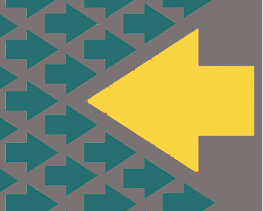by Fred Steinhauser, OMICRON electronics GmbH, Austria
Empathy is a word that seems to pop up always more often in the media. But when reading the related articles, it is mostly about the lack of it.
When browsing through the media, it appeared to me that I have surprisingly often read the word empathy. Columnists reflect about it and relate it to what is going on in our society. And almost always there is some regret that there is too little empathy nowadays.
In the 1980s, everything looked so good. Missiles with nuclear warheads were scrapped and the words “tear down this wall” were spoken. It seemed, the world was becoming a better place.

This thinking and this impression was backed by the Hollywood stereotypes we knew until then. The roles were clearly assigned: there were the bad guys with the black hats and the good guy with the light hat. And in the end, of course, the good guy won. He often had to sacrifice a lot, but the message was: the good ones should succeed.
But meanwhile, a counter movement was already under way. You may smile about this, but public media very much reflects the mainstream thinking of our society and quite often they even shape it. TV series like Dallas indicated what was going on. The new stereotype said that the most ruthless one would succeed. The cynical grin of J.R. Ewing became the face of the winner. Over time, behaving like J.R. was considered at least normal, if not exemplary.
In turn, empathy was overshadowed by greed, the new golden calf of our age. For those who were already rich, this meant to become even more rich. For the not so rich, their greed was partly served by making things cheap. And in this sense, also the “normal people” became accomplices of the rich ones.
OK, some may say this is a complaint of those who are not smart and hardworking enough to make it. Our narrative is that everybody has the chance to succeed. If he doesn’t, it is his own fault. Really?
Not everybody gets the same chances. The circumstances which someone is born into are the most decisive factor. The permeability of our system is not as good as we make ourselves believe. If your parents don’t care about education or cannot afford it, it is unlikely that you will ever get a good education. You are on the weak side, and you have lost right away from the beginning.
To make it, you also need to be a lucky one to some degree. Exceptions, no matter how prominent they are, just confirm this rule.
Now coming back to the greed: enabled by the possibilities of the internet, new business models were created. Of course, they are advertised with the uniqueness, quality, and convenience of the services. But they also catch us with lower or lowest prices. These lower prices come from lower costs, essentially achieved on the expenses of the people at the bottom end of the pecking order. This is neither sustainable nor morally acceptable. We need to understand why the pickers in the warehouses, workers in the logistics of online trading, or the drivers of car ride services, etc. are fighting for fair conditions.
On the other hand, our empathy is still used to support greed in a very peculiar way. In several places, we are informed in a subtle manner that the people who provide the service are poorly paid. And it is expected that the customers compensate for that by tipping. And since we are empathic, we do it.
Biography
Fred Steinhauser studied Electrical Engineering at the Vienna University of Technology, where he obtained his diploma in 1986 and received a Dr. of Technical Sciences in 1991. He joined OMICRON, and worked on several aspects of testing power system protection. Since 2000 he worked as a product manager with a focus on power utility communication. Since 2014 he is active within the Power Utility Communication business of OMICRON, focusing on Digital Substations and serving as an IEC 61850 expert. Fred is a member of WG10 in the TC57 of the IEC and contributes to IEC 61850. He is one of the main authors of the UCA Implementation Guideline for Sampled Values (9-2LE). Within TC95, he contributes to IEC 61850 related topics. As a member of CIGRÉ he is active within the scope of SC D2 and SC B5. He also contributed to the synchrophasor standards IEEE C37.118.1 and IEEE C37.118.2.








